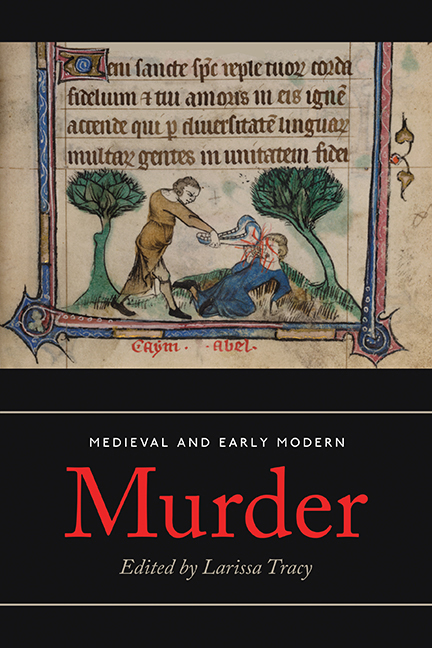Book contents
- Frontmatter
- Contents
- List of Illustrations and Tables
- Acknowledgements
- Contributors
- List of Abbreviations
- Introduction: Murder Most Foul
- I Murder on Trial: Justice, Law and Society
- II The Public Hermeneutics of Murder: Interpretation and Context
- 6 Bringing Murder to Light: Death, Publishing and Performance in Icelandic Sagas
- 7 ‘I Think This Bacon is Wearing Shoes’: Comedy and Murder in the Old French Fabliaux
- 8 ‘Chevaliers ocirre’: Manslaughter, Morality and Meaning in the Queste del Saint Graal
- 9 Murder, Manslaughter and Reputation: Killing in Malory's Le Morte Darthur
- 10 Poisoning as a Means of State Assassination in Early Modern Venice
- 11 Defamation, a Murder More Foul?: The ‘Second Murder’ of Louis, Duke of Orleans (d. 1407) Reconsidered
- 12 ‘A general murther, an universal slaughter’: Strategies of Anti-Jesuit Defamation in Reporting Assassination in the Early Modern Period
- III Murder in the Community: Gender, Youth And Family
- Conclusion
- Select Bibliography
- Index
6 - Bringing Murder to Light: Death, Publishing and Performance in Icelandic Sagas
from II - The Public Hermeneutics of Murder: Interpretation and Context
Published online by Cambridge University Press: 05 July 2018
- Frontmatter
- Contents
- List of Illustrations and Tables
- Acknowledgements
- Contributors
- List of Abbreviations
- Introduction: Murder Most Foul
- I Murder on Trial: Justice, Law and Society
- II The Public Hermeneutics of Murder: Interpretation and Context
- 6 Bringing Murder to Light: Death, Publishing and Performance in Icelandic Sagas
- 7 ‘I Think This Bacon is Wearing Shoes’: Comedy and Murder in the Old French Fabliaux
- 8 ‘Chevaliers ocirre’: Manslaughter, Morality and Meaning in the Queste del Saint Graal
- 9 Murder, Manslaughter and Reputation: Killing in Malory's Le Morte Darthur
- 10 Poisoning as a Means of State Assassination in Early Modern Venice
- 11 Defamation, a Murder More Foul?: The ‘Second Murder’ of Louis, Duke of Orleans (d. 1407) Reconsidered
- 12 ‘A general murther, an universal slaughter’: Strategies of Anti-Jesuit Defamation in Reporting Assassination in the Early Modern Period
- III Murder in the Community: Gender, Youth And Family
- Conclusion
- Select Bibliography
- Index
Summary
THE MEDIEVAL SAGAS OF ICELAND (Íslendinga sögur) capture a world at once fantastic and familiar to modern audiences – a world in which individuals and families fought to survive in a frontier landscape, navigating threats natural and supernatural, political and economic, ultimately creating a complex social organisation unlike any other in the medieval world. Composed during the thirteenth and fourteenth centuries, the sagas reflect a vision of the past lives of Iceland's farmers (bondi) and chieftains (goði) in the tenth- to eleventh-century Icelandic Commonwealth, around and after the time of the country's settlement and conversion to Christianity (c. 1000). A second textual legacy of medieval Iceland is the culture's highly intricate set of legal codes, adopted and maintained at the annual national assembly and regulating conduct in areas ranging from inheritance to slander, from marriage to property disputes over driftwood. Together, the literary and legal texts of Iceland establish the law codes as a shared means of regulating behaviour and of strengthening familial and political connections within communities. Concurrently, the legal and literary texts offer glimpses of the gaps between theory and practice. While the law requires that individuals keep themselves open in their deeds and honest in their reputations, the sagas reveal that the force of the law, in fact, depends upon one's reputation, and that legal rituals meant to bring foul deeds to light could, in turn, be used by characters to conceal guilt and to escape social responsibility.
For cases of homicide, both legal and saga texts provide formulae (verbal and non-verbal) to enable the public pursuit of justice by bringing the act of killing into the open. Yet the Icelandic sagas rarely reproduce the detailed script that legally transforms murder to manslaughter; in most cases, the saga-authors create their own language for bringing murder to light. While saga-characters employ various modes of legal and poetic performance to declare and conceal their own crimes, the saga-authors use these dramatic moments to critique the repurposing and circumvention of Icelandic law by the powerful, revealing the importance of reputation in securing justice and exploring how narrow the space between honour and dishonour might be.
According to Icelandic law, the act that distinguishes manslaughter from murder occurs in the performative act of ‘publishing’ a killing.
- Type
- Chapter
- Information
- Medieval and Early Modern MurderLegal, Literary and Historical Contexts, pp. 139 - 158Publisher: Boydell & BrewerPrint publication year: 2018



